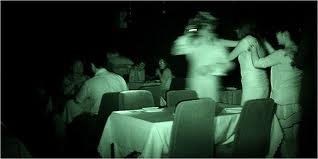 As a person who enjoys food as a hobby and writes critically about the performing arts professionally, I love culinary experiences that are also dramatic.
As a person who enjoys food as a hobby and writes critically about the performing arts professionally, I love culinary experiences that are also dramatic.
I experienced one of the most theatrical meals on Monday night at Opaque, a basement restaurant in San Francisco which specializes in serving meals in the dark.
When I say dark, I mean blacker than pitch. It was so dark in the restaurant that I couldn’t see my hands two inches in front of my face, let alone the table laden with crockery and cutlery, let alone my partner and the other dining guests. All I could do was put up with the fact that my eyes were useless while working my way through an ahi tuna starter, a portobello mushroom-centric main course, a chocolate cake dessert, crudities and dips, two glasses of wine and a cocktail.
Without trying to alter the way I operated I found that the lack of light piqued all my other senses in a way which I had never experienced before.
Theatre also heightens the senses. When it’s good, your eyes and ears feel completely consumed by what you’re seeing and hearing. When it’s bad, the odor of the guy sitting next to you and the hard feel of the seat below you overpower the experience of the show.
People often talk about how “dining in the dark” restaurants (which have been around for the past few years) make the food seem even more delicious because your sense of taste is apparently heightened by the fact that you cannot see. I don’t know what the scientific evidence is to support this claim, but it’s true that my taste buds reacted more strongly to what I was eating and drinking than usual. This was also partly because I was consuming more slowly and carefully than usual owing to the lack of light. On several occasions, I put my hand in the butter dish and crudite dip bowls by accident.
But I was most surprised by how the experience affected my other senses beyond taste. I didn’t expect my hearing to change so radically. Eating three courses and drinking wine (out of stemless glasses to prevent spillages) in sepulchral conditions made me hear conversations going on all over the room with acute sensitivity. In lit conditions, I normally tune out other talk.
And the texture of the table fixtures seemed so much more tactile, from the grain of the cloth napkin on my lap to the cold metal of my fork.
Perhaps the most dramatic aspect of an evening at Opaque is how dependent a seeing person becomes. In the world of light upstairs, blind people often rely on the seeing to get around. But in the dark, the tables are turned.
All of the serving staff at Opaque are blind. Our waitress expertly guided us to our table, served the meal perfectly and helped us to find all the things we needed throughout. Though I’m deeply glad to have the use of my eyes, it was disappointing in some ways to be led back to the light after such an intimate, heightened experience in the dark. On the other hand, I felt pretty helpless. If it hadn’t been for our waitress, I’d probably still be sitting in the dark now.
P.S. When a diner drops a wallet or cellphone at Opaque and can’t find their valuables at the end of the night, someone on the restaurant staff (a seeing person, I assume) dons night goggles to look for the item in the pitch. You learn something new everyday.
